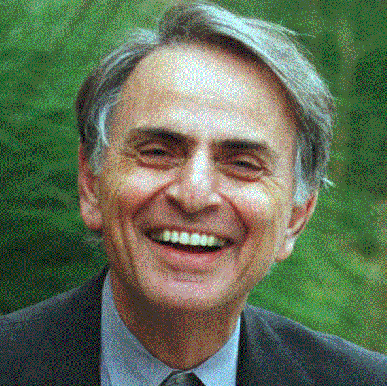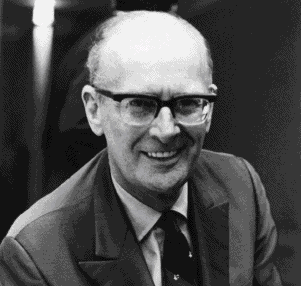Isaac Asimov - Escritor y bioquímico estadounidense nacido en Bielorrusia, exitoso y excepcionalmente prolífico autor de obras de ciencia ficción, historia y divulgación científica. Es lamentable resumir su figura en un párrafo tan pequeño. A nivel personal recomendaría su obra “El Universo: De la Tierra Plana a los Quásares” a todo el mundo. En ella explica el origen de los conocimientos que tenemos del Cosmos, y cómo éstos han ido evolucionando a lo largo de la historia. Obviamente hay nuevos descubrimientos que no están recogidos en la obra (Ésta es de 1966, y Asimov murió en 1992), pero es tan amena y clara que prepara a cualquier lector para ampliar sus conocimientos con cualquier obra posterior que desee. La nave del protagonista se llama Asimov en su honor, aunque él tenía una terrible fobia a volar.
Carl Sagan - Popular astrónomo y divulgador científico de Estados Unidos. Fue pionero en campos como la exobiología y promotor del proyecto SETI (literalmente Búsqueda de inteligencia extraterrestre). Fue titular de la cátedra de astronomía y ciencias del espacio de la Universidad Cornell en Estados Unidos. Conocido por el gran público por la serie para la televisión de Cosmos: Un viaje personal, presentada por él mismo. Las imágenes del programa con la música de fondo de Vangelis son culpables de mi devoción por la música de éste así como de la fascinación que siento por la astronomía. Para saber más sobre la figura de Sagan os remito al podcast que sobre su figura podeis encontrar en la Aldea Irreductible (Que además usa música de Celestia, lo cual me alegra muchísimo).
Arthur C. Clarke - Escritor y científico británico. Autor de obras de divulgación científica y de ciencia ficción, como El centinela o Cita con Rama y co-guionista de 2001: Una odisea del espacio. La historia de la búsqueda del origen de señales inteligentes del espacio le debe mucho.
Erich Von Däniken – No es exactamente una influencia. En realidad es un personaje curioso, un pseudo-científico, escritor suizo en lengua alemana. Conocido por haber difundido la teoría de que la Tierra habría sido visitada por extraterrestres en el pasado (Y refutado sin fin por científicos, especialemente por Carl Sagan). La diferencia es que lo que él expone como teorías yo sólo las he usado como elementos de ciencia ficción en la historia.
Vangelis – Le dedicaré una entrada en exclusiva uno de estos días. Hago música gracias a él. Su libertad a la hora de dirigir el rumbo de su obra, su talento para crear melodías imborrables, su imaginación… Él sí es un compositor. Yo sólo junto notas.
Jean Michel Jarre, Alan Parsons, Mike Oldfield – No voy a hablar de ellos, ya que son de sobra conocidos. Todos ellos son también influencias en mi música, y muy especialmente en este disco.
Edvard Grieg y Gustav Holst – No puedo negar que “El agujero de gusano” aúna aspectos de “El Palacio del Rey de la Montaña” de Grieg y de Saturno, de la maravillosa suite de los planetas de Gustav Holst.
Rush – En absoluto son mi grupo favorito, pero Cygnus X-1 es una referencia a ellos y, de forma más general, al rock progresivo, que escucho muchísimo.
Lost – Soy un fan de la serie de televisión. Hay tres títulos del álbum que referencian a la serie (“Hic Sunt Dracones”, “El incidente” y, por supuesto, “Perdidos”). Los fans sabrán por qué.
Por último, debo decir que la estructura del disco no es original. Sin ir más lejos, el álbum “Return to the Centre of the Earth”, de Rick Wakeman, alterna narración y canciones, e imagino que no será el único ejemplo.
- - - - - - - - - - -
The album contains lots of references and tributes to people and works which have influenced my music, or have inspired it, in one way or another. This is a – probably incomplete - list of them: Isaac Asimov – Northamerican writer and biochemist, born in Byelorussia, succesful and extremely prolific author of sci-fi, history and science divulgation books. Summarizing his figure in such a small paragraph is really painful. In a personal level I’d recommend his book “The Universe: From the flat Earth to the Quasars” to everybody. In ot he explains the source and evolution of our knowledge of the Cosmos. Obviously, there are recent discoveries not on the book (IT’s from 1966, amnd Asimov died in 1992), but it’s so enjoyableand clear that prepares the reader to expand their knowledge with any posterior work he may wish. The spaceship of the main character is called Asimov in his honour, although he had a terrible phobia about flying.
Carl Sagan - Popular astronomer and science divulgator from the USA. He was a pioneer of fields as exobiology, and promoted the SETI project to search for Extra Terrestial intelligence. He owned an astronomy and space sience professorship oat Cornell University. He’s well known to the public for his TV series Cosmos, which he hosted. The images of the show, with the background music by Vangelis are guilty of my devotion to Vangelis music and the fascination I feel for astronomy. To know better Sagan’s figure listen to the podcast (In Spanish) you can find at La Aldea Irreductible (It uses music from “Celestia”, which I’m very proud of).
Arthur C. Clarke – British writer and scientist. Author of science divulgation and sci-fi books like “The sentinel” or “Date with Rama” and co-writer of “2001: A Space Odissey”. The album’s story, with the search of the source of intelligent signals from outer space owes a lot to him.
Erich Von Däniken – Not exactly an influence. An odd character, actually, he’s a Swiss pseudo-scientist and writer. He’s known for spreading the theory thet the Earth was visited by aliens in the past (Endlsessly refuted by scientists, specially by Sagan). The difference is that what he states as theories I have used only as fictional elemnts to the story.
Vangelis – He will have his own entry soon. I make music thanks to his. Enough said. His freedom to choose the aim of his work, his talent to create lasting melodies, his imagination…He’s a composes. I only out notes together.
Jean Michel Jarre, Alan Parsons, Mike Oldfield – I won’t speak about them, since they are enough well-known. They all are also big influences in my music, very specially in this record.
Edvard Grieg and Gustav Holst – I can’t deny “The wormhole” joins aspects from Grieg’s “In the hall of the Mountain King” and from “Saturn”, from the wonderful “Planets Suite” by Gustav Holst.
Rush – Not my favorute grupo at all, but Cygnus X-1 is areference to them and, more in general, to prog rock, which I love to listen to.
Lost – I’m a total fan of the TV show. There are three titles in the album that refer to the series. (“Here be dragons”, “The incident” and “Lost”, of course). Fans will know why.
Last, but not least, I must say the album structure is not original. Without going any further, “Return to the Centre of the Earth”, by Rick Wakeman, alternates narration and songs, and I guess it’s not the only example.
- - - - -





4 comentarios:
It's a great album and it's a nice insight on it that you give through those articles here :)
Peace,
CSW
Echale un vistazo al Podcast ;)
El capitulo del Telescopio Hubble es todo tuyo también :)
Un saludo
¡ Muchas gracias !
Lo tengo descargado, listo para escucharlo. Luego pondré el correspondiente link.
Curioso que no hayas usado "Eyes of the Hubble" :)
Estuve tentado de hacerlo, pero quería utilizar sólo música de tu nuevo disco, y Celestia ya lo utilizé casi en exclusiva en el de Carl Sagan...
ahora es que estoy encantado con El Astronauta :)
Publicar un comentario